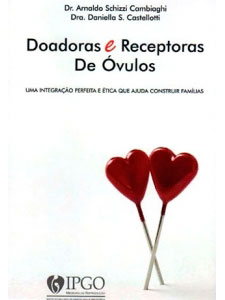Egg Donors and Recipients

PERFECT ETHICAL INTEGRATION HELPING BUILD FAMILIES
This is a book on a controversial issue that arouses the interest of couples and the curiosity of physicians. It is dedicated to women whose eggs are unable to be fertilized, and who find it difficult to accept donated eggs, as well as those who wish to donate their eggs but do not know how they can do so.
It is an ethical book that explains legal aspects and describes the egg donor procedure step by step. It also includes first-person accounts given by women who have donated and received eggs.
Infertility has many causes, and virtually all of them are treatable. However, of all the diagnoses known, the one that women find most difficult to accept is the absence of viable eggs—in other words, the ovary no longer makes eggs that can lead to children. This is a moment of great disappointment and frustration, because women believe they can no longer become mothers. This can affect young women with premature ovarian failure or premature menopause, or who have undergone mutilating surgical procedures in which both ovaries were either removed or extensively manipulated; older women, when the eggs produced do not form good-quality embryos, or even in menopause at the right age (approximately 50).
In this day and age women increasingly put off getting married or trying for a child because they are prioritizing their education or their professional careers, or are seeking material security. Other women of about 50, have found a happy emotional life in a second marriage with a childless man who wants his own family. Sometimes fate has led women to marry late. There are also cases of transmissible genetic and chromosomal diseases that, when a Pre-Implantational Diagnosis is impossible, can use this alternative. Whatever the reason... The solution for these cases is EGG DONATION. These women can be mothers and gestate their child(ren) in their own womb, giving birth to a baby that is the fruit of their husband's sperm and a donated egg from a woman donor. In other words, the child's DNA will not be the same as the mother's who received the egg, but she is the woman who will breastfeed and cherish this child.
The first pregnancy from a donated egg happened in 1984; the patient had entered menopause early. At IPGO we have performed egg donation for more than ten years; it is ethical and legal, provided there is no commercial purpose and the practice is anonymous. The donor will not know the recipient's identity, and vice-versa; this is what the law and ethics determine.
Like any treatment it involves delicate issues and both medical and psychological follow-up are essential. This procedure benefits two couples simultaneously. One where the woman does not have viable eggs, and another that can make this donation and thus reduce the costs of the procedure. This is a process where two IVFs are carried out concomitantly. The aim of this book is to address the major queries about the issue; it describes all the stages of the process of egg donation and is divided in chapters, as below:
- The older recipient
- Evaluating and selecting donor patients
- How does the recipient choose the donor?
- General rules for egg donation
- Who can donate eggs?
- How egg donation is performed
- Treatment of the donor
- Treatment of the recipient
- Psychological support
- Ethical and legal rules
- Short chart for evaluation of donors and recipients
- Questions and Answers
- First-person accounts of donors and recipients
Authors: Arnaldo Schizzi Cambiaghi and Daniella Spilborghs Castellotti
